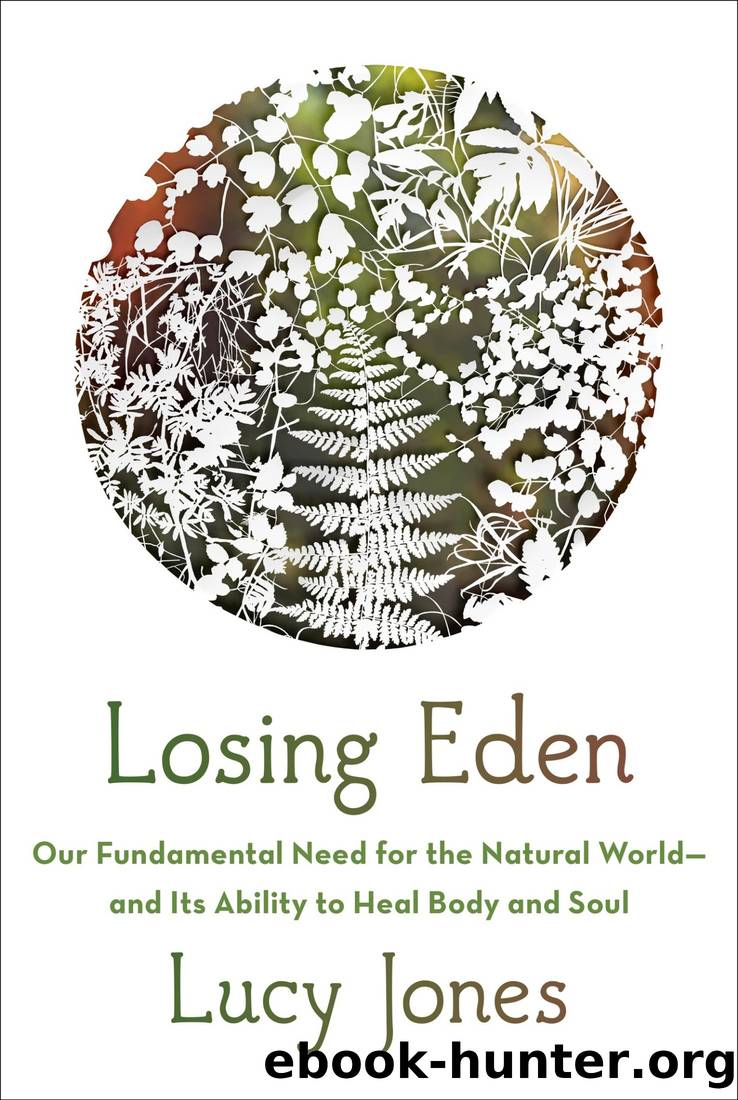Losing Eden: Our Fundamental Need for the Natural World --And Its Ability to Heal Body and Soul by Lucy Jones

Author:Lucy Jones [Jones, Lucy]
Language: eng
Format: epub
Tags: nature, essays, Ecosystems & Habitats, General, BODY; MIND & SPIRIT, Inspiration & Personal Growth, Psychology, science, Life Sciences, Ecology, Self-Help, Green Lifestyle
ISBN: 9781524749323
Google: cXfZzQEACAAJ
Publisher: Knopf Doubleday Publishing Group
Published: 2021-11-15T23:47:00.194916+00:00
* * *
â
Itâs not often that a scientific idea is called âbeautiful,â but this was how one academic described the keystone work of Professor Mitchell at the University of Glasgow. His research suggests, convincingly, that greener neighbourhoods which offer a connection with nature might actually reduce the health gap between rich and poor and lead to a better, more equal society. âInequality has barely got any better,â he said, at the start of his talk at a conference I attended in Bonn, Germany. âThis matters; itâs unfair.â Could nature connection really reduce socio-economic health inequalities? My ears pricked up.
Mitchellâs concept is known as âequigenesis.â If an environment is equigenic, it may reduce the gap between the rich and the poor by weakening the link between socio-economic inequality and health inequality. Because of their many health benefits, natural environments are potentially equigenic.
Mitchell spent his early career mapping and measuring socio-economic inequalities, monitoring the health gap and showing that it was getting worse. It became clear to him that to fix the problem of inequality on a massive scale, âyou would need a socio-economic revolution.â He began to find the work depressing as he realized it wasnât going to happen anytime soon and, anyway, massive redistribution of wealth and income wasnât democratically supported. âI began to feel that although a lot of that work was useful and valuable, it wasnât moral,â he told me. âWe were calling for some massive change that didnât seem to be on the horizon and we werenât offering any alternatives.â
He began to think about what might be doable on a short timescale. From there, he moved into studying resilience, and specifically the idea that there are groups of people in difficult living conditions who seem to do better than expected. He decided to look at places that were poor, but where the health of the population wasnât too bad. There were certain places in the United Kingdom, some in the north-east, which demonstrated such resilience. There, a sense of community or having something in common was important, such as ethnic identity or common industrial heritage. Another factor was green space.
Mitchell had always been an âoutdoorsyâ type, and he started following the growing literature around nature and health. He theorized that income-related inequality in health would be less pronounced in populations with greater exposure to nature because green space acts to reduce stress. Looking at populations across England, he anticipated an association between green space and population health, but he wasnât expecting to see such a strong result. âIt was a genuine moment of discovery for us,â he said. With Dr. Frank Popham, he found that people who lived near parks and woodlands had lower levels of income-related health inequalities. Using national mortality records from the United Kingdom Office for National Statistics, alongside green space measurements, they paired low-income groups with varying levels of urban green space to see the effect on mortality rates. The rates of income-related mortality were much lower in areas with more green space.
Download
This site does not store any files on its server. We only index and link to content provided by other sites. Please contact the content providers to delete copyright contents if any and email us, we'll remove relevant links or contents immediately.
Spare by Prince Harry The Duke of Sussex(5186)
Machine Learning at Scale with H2O by Gregory Keys | David Whiting(4301)
Fairy Tale by Stephen King(3378)
Will by Will Smith(2916)
The Bullet Journal Method by Ryder Carroll(2564)
Hooked: A Dark, Contemporary Romance (Never After Series) by Emily McIntire(2552)
Rationality by Steven Pinker(2354)
It Starts With Us (It Ends with Us #2) by Colleen Hoover(2354)
Can't Hurt Me: Master Your Mind and Defy the Odds - Clean Edition by David Goggins(2327)
Friends, Lovers, and the Big Terrible Thing by Matthew Perry(2222)
The Becoming by Nora Roberts(2191)
Love on the Brain by Ali Hazelwood(2063)
A Short History of War by Jeremy Black(1844)
The Strength In Our Scars by Bianca Sparacino(1842)
HBR's 10 Must Reads 2022 by Harvard Business Review(1841)
Leviathan Falls (The Expanse Book 9) by James S. A. Corey(1730)
A Game of Thrones (The Illustrated Edition) by George R. R. Martin(1729)
515945210 by Unknown(1664)
Bewilderment by Richard Powers(1609)
